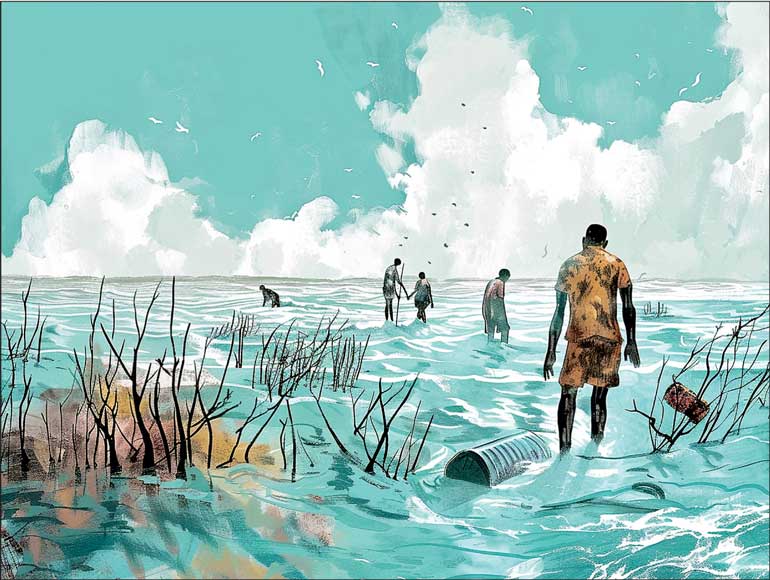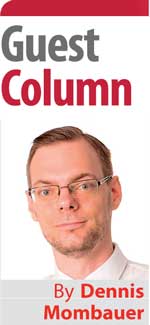Tuesday Feb 17, 2026
Tuesday Feb 17, 2026
Saturday, 24 August 2024 00:10 - - {{hitsCtrl.values.hits}}

There is a broad range of climate-induced losses that are difficult to restore, reverse, or quantify
 Climate-induced loss and damage refers to the impacts of climate change that exceed the practical or theoretical limits of adaptation. It is increasingly recognised as an important challenge for countries across the world and seen by many as the third pillar of the Paris Agreement in addition to mitigation (the reduction of greenhouse gas emissions) and adaptation.
Climate-induced loss and damage refers to the impacts of climate change that exceed the practical or theoretical limits of adaptation. It is increasingly recognised as an important challenge for countries across the world and seen by many as the third pillar of the Paris Agreement in addition to mitigation (the reduction of greenhouse gas emissions) and adaptation.
While economic losses and damages—such as destruction of property, assets, infrastructure, or the loss of agricultural production—can potentially be repaired and compensation payments might enable affected communities to rebuild and recover, there is a broad range of losses that are difficult to restore, cannot be reversed, or not easily quantifiable in financial terms. These “non-economic” losses can affect individuals, communities, or the natural environment, and result from a variety of climatic events and processes.
Challenges of scope and definition
There are three key challenges when it comes to non-economic loss: how to define and measure it, how to prevent it, and how to respond to it.
What counts as non-economic loss is hard to pinpoint and harder to exactly define. Under the United Nations Framework Convention on Climate Change (UNFCCC) and the Warsaw International Mechanism for Loss and Damage, non-economic losses are roughly grouped into nine categories: loss of life, loss of health, human mobility, loss of territory, loss of cultural heritage, loss of Indigenous knowledge, loss of societal/cultural identity, loss of ecosystem services, and loss of biodiversity.
However, while these categories are useful to understand the scope of non-economic loss, they can prove difficult to apply in practice, especially when looking at indirect and/or long-term impacts. Loss of culture, for example, can refer to a loss of arts and crafts, traditions, languages, or local knowledge; but it could also encompass loss of social cohesion and cultural identity, a loss of sense of place, or even tangible cultural heritage, such as religious or archaeological sites.
In case of climate-related disasters, physical infrastructure, risk-aware planning, and insurance are common instruments that can minimise or address economic L&D. But even if an insurance scheme can pay out money after a flood or storm, what about potential trauma or long-term mental health impacts? What about a lost sense of safety or security? What about lost school time or possessions that can’t be replaced, such as educational certificates, personal writings, or objects of emotional value? How can we quantify such losses, and how can there be compensation for them?
Similarly, how do we protect immovable cultural sites threatened by sea level rise? How do we ensure that local traditions survive even if communities migrate away? Non-economic loss sits at the intersection of multiple human systems, including healthcare, education, social protection, performing arts, creative industries, and trade. Addressing non-economic loss in just and equitable ways is a complex challenge that needs to consider local discourses as well as agency, dignity, and self-determination of affected groups and communities.
Cultural loss and heritage
With the advent of the Global Goal on Adaptation (GGA) and the UAE Framework for Global Climate Resilience—key outcomes of the 28th meeting of the Conference of the Parties (COP28) at the end of 2023—, cultural heritage has also found renewed attention as part of climate change adaptation. Out of the GGA’s seven dimensional targets, one explicitly focuses on “protecting cultural heritage from the impacts of climate-related risks by developing adaptive strategies for preserving cultural practices and heritage sites and by designing climate-resilient infrastructure, guided by traditional knowledge, Indigenous Peoples’ knowledge and local knowledge systems.”
Other targets under the GGA are relevant to non-economic loss well, such as climate-related health impacts, climate impacts on ecosystems and biodiversity, and the necessity for adaptive social protection systems. As outlined above, these areas correspond to many of the categories of non-economic loss that have been identified for individuals, societies, and the natural environment.
The preservation of cultural heritage and traditions, as well as their integration into systems of risk management and adaptation, can play a key role for avoiding non-economic loss and ensuring that local and traditional knowledge and practices do not get lost. If non-economic losses can be minimised or averted through adaptation efforts, it reduces the need for ex-post responses, which could include actions such as documentation, memorialisation, psychosocial support, reconstruction, relocation, and other forms of support.
Looking ahead
For non-economic and cultural loss, preventing and mitigating impacts should be the highest priority, as many forms of loss cannot be reversed and have profound consequences in the short, medium, or long term. Therefore, providing effective assistance and support to vulnerable communities and groups is critical, especially in the face of imminent or projected losses.
Non-economic loss is still an emerging field of study with critical implications for those affected but also for policymakers, negotiators, practitioners, and implementing organisations working on addressing loss and damage as well as those involved in adaptation and risk management. Evidence-based approaches to assess and valuate non-economic loss, provide effective and inclusive support, and build on interlinkages between culture, livelihoods, risk management, adaptive capacities, resilience, development processes, and ecosystem conservation is an important part of climate action on all levels.
(The writer works as Director: Research & Knowledge Management at SLYCAN Trust, a non-profit think tank based in Sri Lanka. His work focuses on climate change, adaptation, resilience, ecosystem conservation, just transition, human mobility, and a range of related issues. He holds a Master’s degree in Education from the University of Cologne, Germany and is a regular contributor to several international and local media outlets.)